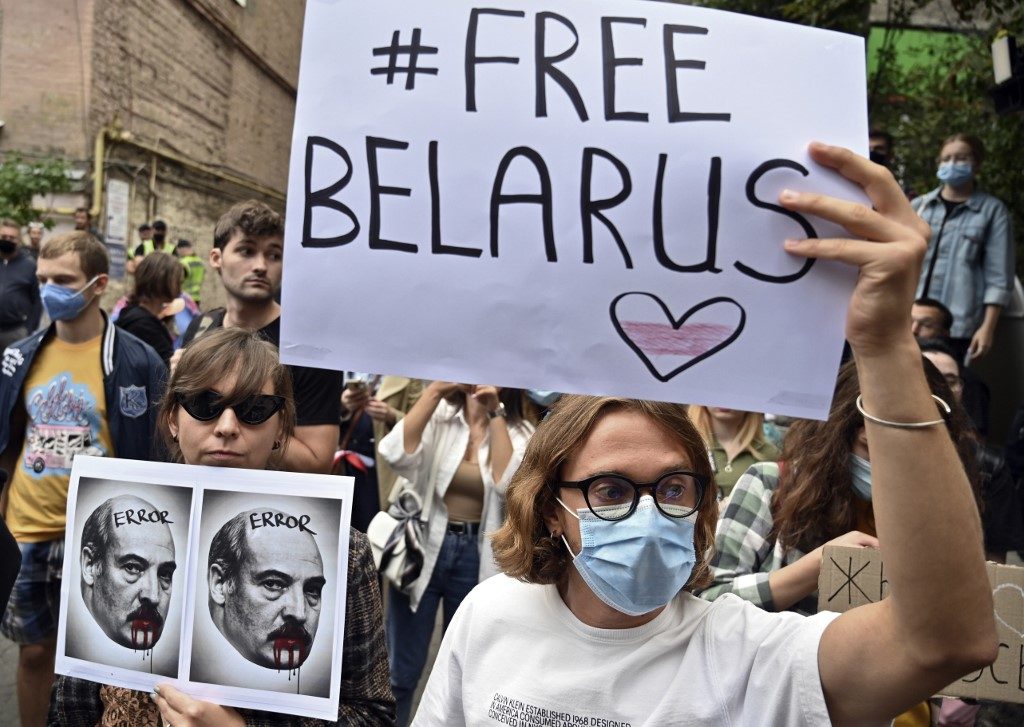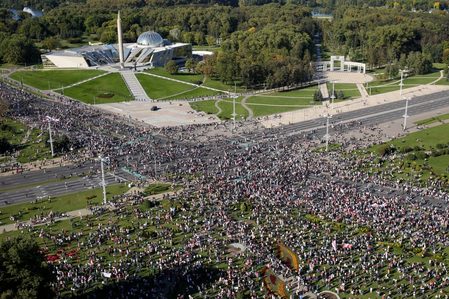SUMMARY
This is AI generated summarization, which may have errors. For context, always refer to the full article.


EU foreign ministers on Monday, September 21, failed to agree sanctions over the political crisis in Belarus, despite a plea for support from opposition leader Svetlana Tikhanovskaya.
The former Soviet republic has been convulsed by unprecedented demonstrations and a brutal crackdown by President Alexander Lukashenko since he was returned to power in a disputed August 9 election.
Tikhanovskaya met EU foreign ministers in Brussels and urged them to sanction Lukashenko but, despite repeated warnings to the veteran strongman, after more than 6 weeks the bloc has still yet to act.
Cyprus, which has good relations with Lukashenko’s key supporter Russia, has blocked EU agreement on measures against Belarus, insisting that sanctions against Turkey over a maritime gas drilling dispute must be agreed at the same time.
“Although there is a clear will to adopt these sanctions, it has not been possible to do that today because the required unanimity was not reached,” EU diplomatic chief Josep Borrell told reporters after hosting the talks.
Cyprus’s position has support from some EU countries, but the patience of others is wearing thin.
“It is regrettable that today we could not decide on sanctions on violations of human rights there due to ‘a hostage taking’ by a member state,” Latvian Foreign Minister Edgars Rinkevics wrote on Twitter.
“Sends a wrong signal to Belarusians, our societies and the whole world.”
Cypriot foreign minister Nikos Christodoulides defended his country’s stance, insisting the EU must have a coherent response to violations of sovereignty and human rights.
“Our reaction to any kind of violation of our core basic values and principles, cannot be a la carte. It needs to be consistent,” he said.
France’s minister for European affairs, Clement Beaune, told reporters in Brussels he understood Cypriot concerns about Turkey.
But added: “I think we have to unblock this, untie this bond. We must be able to make progress on the sanctions against Belarus, this does not weaken Europe – on the contrary.”
Sanctions call
The matter will now be considered by EU leaders at a summit in Brussels on Thursday and Friday.
Borrell said he wanted the sanctions signed off before the next meeting of foreign ministers in October, warning that “the credibility of the European Union” depended on it.
After meeting the EU ministers, Tikhanovskaya told reporters that sanctions were a key tool to “force the so-called authorities to start dialogue with us.”
“I think leaders have reasons not to push for these sanctions but at this meeting I asked just to be more brave in their decisions,” she said.
The EU and other Western powers have rejected the result of the election, saying the poll was not free and fair, and Brussels has drawn up a list of around 40 members of Lukashenko’s regime to hit with asset freezes and travel bans.
“We must also address the question of whether Mr Lukashenko, who is the main responsible, should not also be sanctioned by the European Union,” said Germany’s Foreign Minister Heiko Maas.
The strongman, who has ruled Belarus for more than a quarter of a century, has responded to the protests with a security clampdown and turned to his longstanding ally Russia for help.
Tikhanovskaya, who fled to Lithuania for her own safety after the election, backed sanctions on Lukashenko himself.
And she urged the EU to make a formal call for new elections – something it has so far held off from, despite rejecting the August 9 poll as illegitimate.
In the latest protests against Lukashenko, tens of thousands defied a heavy security presence to march in the streets of Minsk on Sunday, with authorities saying they detained more than 440 people.
The EU is also considering what finance could be given to civil society in Belarus, after Poland called for a billion-euro stabilisation fund to help the country.
Tikhanovskaya warned care must be taken to ensure the money does not end up in Lukashenko’s coffers, effectively funding him to carry out further repression.
Tikhanovskaya’s meeting with EU ministers, followed by an appearance at the European Parliament, was part of her effort to maintain international pressure on Lukashenko as he clings to power. – Rappler.com
Add a comment
How does this make you feel?

There are no comments yet. Add your comment to start the conversation.